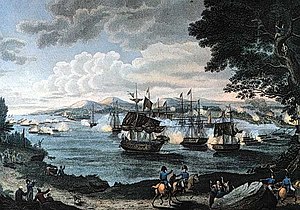Battle of Plattsburgh
| Battle of Plattsburgh | |||||||
|---|---|---|---|---|---|---|---|
| Part of the War of 1812 | |||||||
 Naval battle on Lake Champlain. Engraving in 1816 by B. Tanner |
|||||||
|
|||||||
| Belligerents | |||||||
|
|
|
||||||
| Commanders and leaders | |||||||
|
Thomas Macdonough Alexander Macomb |
George Prevost George Downie † |
||||||
| Strength | |||||||
| 1,500 regulars 1,900 militia 1 corvette 1 brig 1 schooner 1 sloop 10 gunboats |
≤14,000 1 frigate 1 brig 2 sloops 12 gunboats |
||||||
| Casualties and losses | |||||||
| 104 killed 116 wounded |
168 killed 220 wounded 317 captured 1 frigate captured 1 brig captured 2 sloops captured |
||||||
American victory;
The Battle of Plattsburgh, also known as the Battle of Lake Champlain, ended the final invasion of the northern states of the United States during the War of 1812. A British army under Lieutenant General Sir George Prévost and a naval squadron under Captain George Downie converged on the lakeside town of Plattsburgh, which was defended by New York and Vermont militia and detachments of regular troops of the United States Army, all under the command of Brigadier General Alexander Macomb, and ships commanded by Master Commandant Thomas Macdonough. Downie's squadron attacked shortly after dawn on 11 September 1814, but was defeated after a hard fight in which Downie was killed. Prévost then abandoned the attack by land against Macomb's defences and retreated to Canada, stating that even if Plattsburgh was captured, any British troops there could not be supplied without control of the lake.
When the battle took place, American and British delegates were meeting at Ghent in the Kingdom of the Netherlands, attempting to negotiate a treaty acceptable to both sides to end the war. The American victory at Plattsburgh, and the successful defense at the Battle of Baltimore which began the next day and halted British advances in the Mid-Atlantic states, denied the British negotiators leverage to demand any territorial claims against the United States on the basis of Uti possidetis, i.e. retaining territory they held at the end of hostilities. The Treaty of Ghent, in which captured or occupied territories were restored on the basis of Status quo ante bellum, was signed three months after the battle.
In 1814, most of Britain's army was engaged in the Peninsular War. Then in April, Napoleon I abdicated the throne of France. This provided Britain the opportunity to send 16,000 veteran troops from the Peninsula and other garrisons to North America. Several experienced Major-Generals were also detached from the Duke of Wellington's army to command them. The Secretary of State for War and the Colonies, the Earl of Bathurst, sent instructions to Lieutenant-General Sir George Prévost, the Commander-in-Chief in Canada and Governor General of the Canadas, authorizing him to launch offensives into American territory, but cautioning him against advancing too far and thereby risking being cut off.
...
Wikipedia
